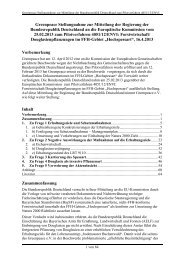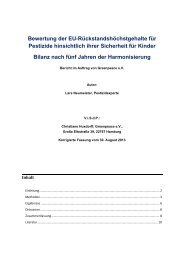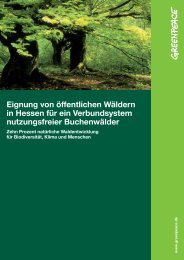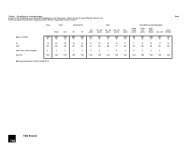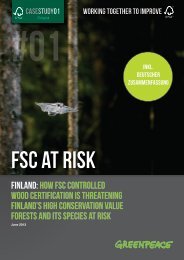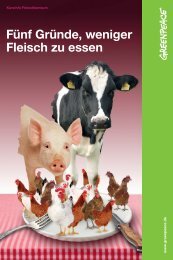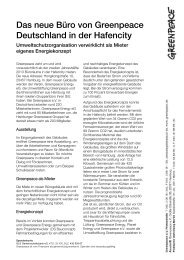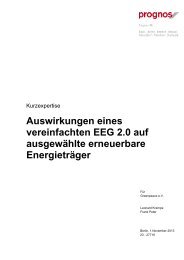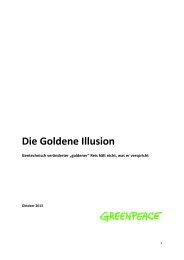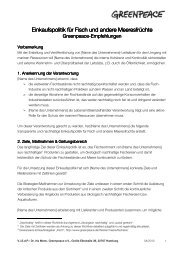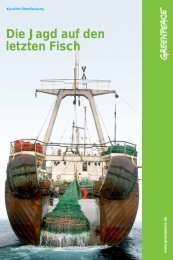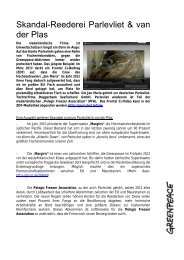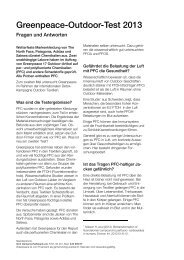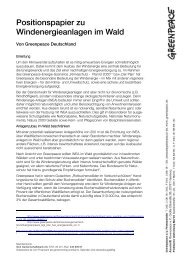Untitled - Greenpeace
Untitled - Greenpeace
Untitled - Greenpeace
You also want an ePaper? Increase the reach of your titles
YUMPU automatically turns print PDFs into web optimized ePapers that Google loves.
CARVING UP THE CONGO<br />
47<br />
©<strong>Greenpeace</strong>/Davison<br />
TAXING CREDIBILITY: THE<br />
REVENUE FROM LOGGING WILL<br />
NOT GO FAR … FROM KINSHASA<br />
Central to the World Bank’s strategy for<br />
development via reform of the forestry sector<br />
is the redistribution of tax revenues back from<br />
national to local level, backed up by an<br />
increased level of area tax. This is supposed to<br />
bring funding to enable the state to provide<br />
social infrastructure.<br />
The tax revenue redistribution is at best a<br />
limited measure, however. In 2007 the area tax<br />
is $0.50/hectare (in the case of new<br />
allocations following the legal review, the level<br />
of area tax to be paid will be determined by<br />
the offer of the highest bidder). Assuming that<br />
10 million hectares of forest is under<br />
concession after the legal review and that tax<br />
collection from these concessions is 100%<br />
effective, the measure will still only net total<br />
revenue of $5 million annually, of which 40%<br />
($2 million) is to be redistributed to provinces<br />
and territories to ensure the provision of basic<br />
community infrastructure in a country about<br />
the size of Western Europe.<br />
‘Information in our possession<br />
gives an account of the<br />
current state of play<br />
regarding the assignment of<br />
forest area royalties resulting<br />
from logging in Orientale<br />
Province … This completely<br />
incomprehensible situation<br />
not only violates the relevant<br />
provisions of the Forestry<br />
Code, but also by its nature<br />
deprives Orientale Province of<br />
necessary resources for<br />
reconstruction after the years<br />
of war and destruction.’ 272<br />
Théo Baruti Amisi Ikumaiyete,<br />
Governor of Orientale<br />
Province, 2005<br />
It is clear that access to the<br />
documents allowing proper<br />
verification of the state of<br />
affairs of tax payment ...is<br />
difficult if not impossible. 273<br />
WRI-Agreco (Independent<br />
Observer for DRC forestry<br />
reform), 2007<br />
In reality, of course, even less money is likely<br />
to be available, since the process threatens to<br />
be undermined by corruption, as has happened<br />
in neighbouring Cameroon. To date in the DRC,<br />
systems of distribution or control to ensure<br />
that this money is actually devolved have<br />
simply not been set up at provincial or<br />
territorial levels. According to the World Bank,<br />
area fees were not transferred in 2003-<br />
2006. 274<br />
Given the experience of the impacts of poor<br />
institutional capacity and corruption in<br />
Cameroon, it is hard to imagine how the World<br />
Bank can have been so naïve as to allow such a<br />
situation to arise again. In any event, it is clear<br />
that local communities have not benefited at<br />
all, as yet.



